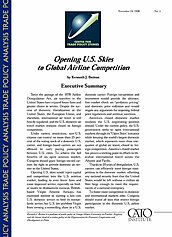Under current restrictions, non‑U.S. citizens can control no more than 25 percent of the voting stock of a domestic U.S. carrier, and foreign-based carriers are not allowed to carry paying passengers between U.S. cities. To achieve the full benefits of an open aviation market, Congress should grant foreign-owned carriers the right to provide domestic air service in the United States.
Opening U.S. skies would inject capital and competition into the U.S. aviation market, leading to even lower fares and more improved service, especially on feeder routes to destinations overseas. British-based Virgin Atlantic Airways has expressed interest in starting a low-cost U.S. domestic service to feed its transatlantic service, but U.S. law prohibits Virgin from owning a controlling share in a U.S. domestic carrier. Foreign competition and investment would provide the ultimate, free-market check on “predatory pricing” and domestic price collusion and would negate any arguments for imposing federal price regulations and antitrust sanctions.
America’s closed domestic market weakens the U.S. negotiating position abroad. Under the current policy, the U.S. government seeks to open international markets through its “Open Skies” initiative while keeping the world’s largest domestic market, which represents more than one-quarter of global air travel, closed to foreign competition. America’s closed market has proven a sticking point in efforts to liberalize international travel across the Atlantic and Pacific.
Thanks to 20 years of deregulation, U.S. carriers can efficiently meet foreign competition in the domestic market, offsetting any national security fears that the United States would be left without a civilian air fleet large enough to meet the requirements of a national emergency.
To foster more competition in domestic and international markets alike, Congress should repeal all laws that restrict foreign participation in the domestic U.S. airline market.

